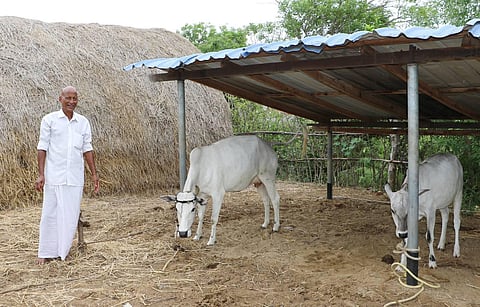

NAGAPATTINAM: Can crops for our food be prepared organically and nutritiously using diligently prepared inputs in the delta? N Veeraragavan, a school headmaster from Pannal village in Nagapattinam district, has an emphatic yes for an answer. The 56-year-old Panchayat Union Primary School headmaster raises crops using an advanced organic farming method called 'Biodynamic Farming'.
Veeraragavan, who has been successfully practising 'Biodynamic Agriculture' (Uyir Iyakka Velanmai), as a first in the delta district, says, "My objective is to contribute to creating a healthy society with organic food. I want people to live free from ailments. Biodynamic Agriculture enriches our crops, adds more nutritive value and makes our food healthier and tastier."
Veeraragavan cultivates crops such as paddy, coconut, sesame, banana, mango and jasmines on his 10-acre land in Adhanur village near Vedaranyam using this method.
Among established practices of biodynamic agriculture, Veeraragavan makes and applies four. They are Horn Manure (Kombu Saanam), Horn Silica (Kombu Manarchatthu), Cow Pat Pit Fertilizer (Pasunchaan Kuzhi Uram) and Biodynamic Compost (Uyiriyakka Kooteru)
"There are only a few biodynamic farmers across Tamil Nadu. Most of them are in the western districts. I attended training programmes in places like Mettupalayam and Coonoor and learnt biodynamic agriculture methods from my mentors T Navaneedhakrishnan and Mahesh Melvyn. I started to use their inputs for a year. Then, I started to make my fertilisers and gained significant benefits," Veeraragavan says.
He makes horn manure and horn silica using bovine horns as vessels during the months-long preparation annually. He has made hundreds of kilos of cow pat pit fertilizer in a pit shed and made tonnes of biodynamic compost in the past year. He uses dung from his cows, silica from construction site debris, eggshells from bakeries and green wastes from his trees as ingredients.
Veeraragavan follows a calendar to make and apply them. "Biodynamic farmers follow astronomically important days to apply fertilisers and achieve a better quality of productivity. As my father was an astrologer, I follow the astrological calendar religiously," Veeraragavan adds.
He buys fertilisers like Yarrow Compost, Chamomile Compost, Stinging Nettle Compost, Oak Bark Compost, Dandelion Compost and Valerian Compost from other biodynamic farmers and for his crops. Those which he buys from others are prepared by using cleaned animal organs like deer bladders, bovine intestines, cattle skulls and bovine visceral membranes as vessels by other biodynamic farmers. Yet, Veeraragavan's family eats vegetarian food.
Veeraragavan's farming method has impressed the Agriculture Department. S Panneerselvam, Joint Director of the department, says, "Biodynamic agriculture is still theoretical for many farmers and academicians. Veeraragavan took the initiative to practise it. We hope many farmers learn from him. We are planning to invite him to our workshops on organic farming."
Veeraragavan is also trying to motivate more farmers across Vedaranyam to practise biodynamic agriculture.
R Karthikeyan, a Tamil teacher and farmer from Pushpavanam, says, 'I used the farm inputs from Veeraragavan's biodynamic agriculture. It helped me nourish my paddy crops and revive my flowering plants. Now, I have begun to make fertilizers like him, following his methods for my cultivation."